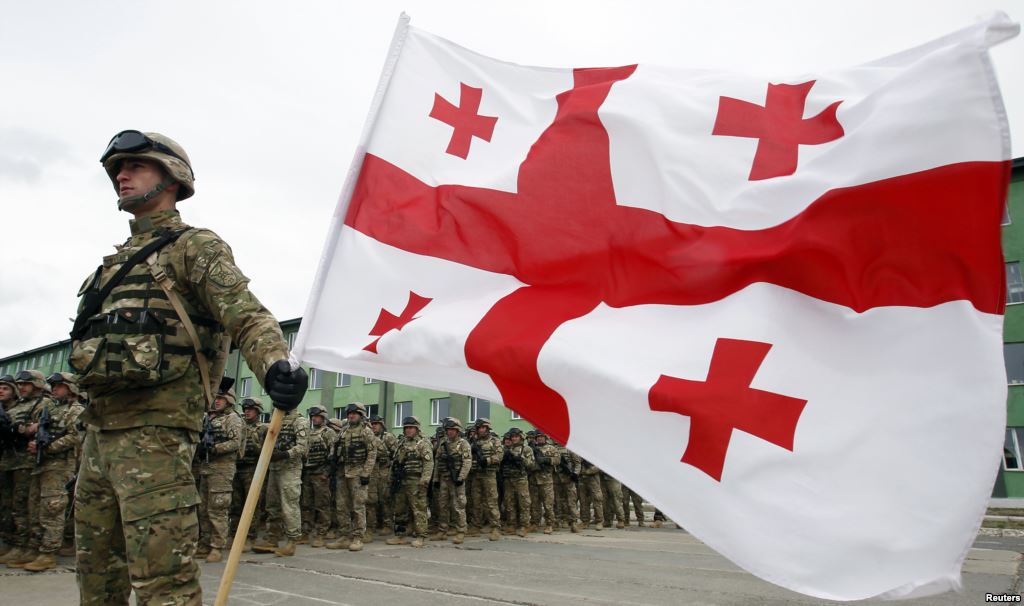Tinatin Khidasheli does not hide her impatience with NATO. As defense minister of Georgia, she has spent the past several months lobbying NATO members to grant her country a “membership action plan,” or MAP.
In practical terms, this would amount to putting Georgia on an irreversible path toward joining the U.S.-led military alliance. It would also end Georgia’s security vacuum, which was fully exposed when Russia invaded the country in August 2008 . Yet when NATO holds its summit in Warsaw on July 8-9, Georgia can expect little. A Georgian MAP will not be on the agenda.
“There are many NATO countries that favor giving Georgia MAP,” a senior NATO official said on condition of anonymity because of the sensitivity of the topic. “It was agreed that all enlargement decisions would be settled in December to avoid a divisive debate in the run-up to Warsaw,” he said. But even in December it’s still not certain that Georgia will be given MAP status.
What is particularly galling for those countries supporting Georgia’s NATO membership is that in Warsaw, Montenegro will officially become the alliance’s 29th member. Forget the fact that this western Balkan country is still highly corrupt, has contributed, compared with Georgia, the minimum to NATO missions and has not matched the big structural defense reforms undertaken by Tbilisi.

Leading the opposition to Georgia getting MAP status and ultimately joining NATO is Germany and France. They believe it would provoke Russia, which has already warned that there will be consequences if Georgia (or Ukraine) were ever to join the alliance. They also believe that Georgia is not defendable. NATO, they believe, would not go to war against Russia.
Khidasheli is more than frustrated by these views. They imply that Russia can impose a veto on Georgia’s security and strategic direction. “There is too much talk of Russia. There is too much concern about what Russia says, what Russia thinks and too little about what NATO wants,” she said in an interview. “This is about NATO’s credibility in being able to keep to its membership promise to Georgia.”

At least in another part of Brussels, where the European Union’s institutions are based, Georgia has had a predictable relationship. Until now.
In 2014, the E.U. and Georgia signed the landmark Deep and Comprehensive Free Trade Area (DCFTA) agreement. As a result, in 2015, imports from Georgia were up 12 percent.
Germany claims that Georgian Dream, the governing coalition that is rife with internal feuds, hasn’t done enough to stop mafia and criminal gangs from entering Europe, even alleging that the groups carried out the most burglaries in Germany. German police authorities have rebutted such allegations.
The real reason for Berlin’s opposition to the visa waiver is internal politics.
German Chancellor Angela Merkel’s Christian Democratic Union party is alarmed at the rise of Alternative for Germany, an anti-immigrant, anti-Islam and Eurosceptic party. It is chiseling away at support for Merkel’s conservative bloc and the Social Democrats, her coalition partners. The last thing Merkel wants is for AFD to make hay over granting a visa-free regime to Georgia.
Yet this is precisely what she has negotiated with Turkey. Merkel’s decision to push E.U. members into agreeing to allow Turks to travel to European countries without a visa in return for Turkey tightening its borders, taking back refugees stranded in Greece and meeting other conditions has led to a backlash in Germany.
“Look at what is happening in Turkey to human rights, to press freedom, to the opposition,” said Claudia Roth, a German legislator and member of the opposition Green Party. “We are throwing away our values.”

When it comes to Georgia, besides opposition from some member states, the European Parliament is also divided over the visa issue.
“We should give Georgia the visa-free regime,” said Elmar Brok, chairman of the parliament’s foreign affairs committee and a leading member of Merkel’s Christian Democratic Union party. “But first there must be safeguards agreed such as the possibility of being able to suspend the arrangement if the system is abused.”
But Jacek Saryusz-Wolski, a Polish deputy who belongs to the same conservative grouping in the European Parliament as Brok, is staunchly against giving Georgia a visa-free regime. “Georgian Dream party is trampling on fundamental rights,” he said.
Saryusz-Wolski added that the media were coming under huge pressure from Georgian Dream to toe the government line. It had taken over the Rustavi-2 television station that had been associated with the opposition United National Movement, led by former president Mikheil Saakashvili. Indeed, many analysts argue that since taking power in 2012, Georgian Dream has has waged a vendetta against former UNM ministers.
“The European Commission is closing its eyes to all these things,” Saryusz-Wolski said.
With parliamentary elections due in October, Georgian Dream desperately needs something from the West. Its popularity is falling as it tries to spur growth and employment.
Combined with dithering by NATO and the E.U., disenchantment with the West is growing.
According to opinion polls, between November 2013 and August 2015, support for integration with the E.U. decreased from 85 percent to 61 percent (while opposition rose from 10 percent to 21 percent). Support for NATO dropped from 81 percent to 69 percent.
These trends play into Russia’s hands. In Georgia, pro-Russian movements, political parties, oligarchs and Russian TV warn Georgians that they are being betrayed by the West. The message: Better to switch direction.
“All this time spent in the waiting room leads to much frustration,” Khidasheli said. “Undeliverable Europe and NATO are the main cards used by the pro-Russian forces in Georgia."






